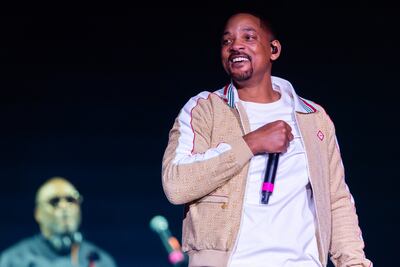Will Smith's musical performance at the BET Awards was a long time coming.
The Hollywood star reminded us of his hip-hop pedigree with an affecting performance of You Can Make It, an ode to resilience, performed with singer Kirk Franklin and Kanye West’s Sunday Service Choir.
Everything about it was seemingly crafted to create a viral talking point. There was emotional actress Taraji P Henson introducing “my brother Smith” and then the rapper appearing in the middle of a ring of fire.
The spectacle formed part of Smith’s comeback following the infamous slap incident with comedian Chris Rock at the 2022 Academy Awards.
On the big screen, all appears forgiven with Bad Boys 4: Ride or Die already becoming the second-biggest instalment in the action-comedy franchise with more than $330 million taken in the box-office.
While returning to a popular role is not much of a creative stretch for Smith, re-entering the hip-hop fray with a new album is a different matter altogether.
You Can Only Make It is his second single in 19 years – a time frame nearly half as long as the genre itself and a period during which generations of hip-hop acts and styles have come and gone. With the genre also traditionally eschewing towards relatively younger artists and fresher sounds, does Smith face irrelevance when new his album, Dance in Your Darkest Moments, arrives later in the year?
A change of heart
Over the past two decades music seems to have been a hobby for Smith.
It was something done while shooting in exotic locations, such as a 2019 Budapest concert while filming Gemini Man in Hungary. Or on family holidays, like when teaming up with long-term collaborator DJ Jazzy Jeff for an impromptu Dubai New Year's Eve gig in 2013.
That leisurely impulse began to change in 2020, a year marking the 30th anniversary of Smith’s star-making sitcom The Fresh Prince of Bel-Air.
Speaking to The National a month before the pandemic arrived to upend the music industry, DJ Jazzy Jeff said plans were in the motion for the duo to go on tour.
It took a bigger anniversary for Smith to make a rare American musical appearance, having joined fellow veterans Queen Latifah, Public Enemy and Common in A Grammy Salute to 50 Years of Hip-Hop in 2023.

The telecast was followed five days later by a headline set at Riyadh’s Soundstorm festival in front of 50,000 people. In its review The National praised the committed performance, stating that Smith rediscovered “some of that purity of purpose that propelled him to stardom”.
Hip-hop is now embracing nostalgia. It is doing so through lucrative tours by veteran acts like 50 Cent and Snoop Dogg and by the building of a museum dedicated to the genre in New York.
But Smith's star power doesn't come from hip-hop. It comes from Hollywood. When hip-hop began taking over the charts, Smith began taking over the box office. The breezy yet saccharine music increasingly served as a platform to promote his films and associated works.
In 1997, Smith recorded the hit theme song for the film Men in Black, a move propelling his debut solo album Big Willie Style to big sales. Smith repeated the trick for 1999 film Wild Wild West and Men in Black II in 2002.
Over the next two decades, Smith took on more ambitious acting roles in films such as The Pursuit of Happyness (2006) and Collateral Beauty (2015), but his music faded away. It seemed to have served its purpose.
It was a development not lost on the hip-hop community, but it remained largely ambivalent about Smith’s Hollywood success. The exception was Eminem, whose early songs like 1999's Get U Mad and 2000 hit The Real Slim Shady offered withering criticism of Smith’s persona and sound.
This year marks the 35th anniversary of Smith's most significant contribution to the hop-hop genre. At the 1989 Grammy Awards ceremony, the Best Rap Album and Best Rap Performance were introduced. They were both won by DJ Jazzy Jeff & the Fresh Prince.
Following the Grammy's decision to not include the Best Rap Performance as part of its telecast, Smith boycotted the ceremony. It was a move that set the scene for the Grammy’s troubled history with hip-hop.
But over recent years the genre has increasingly been respected by the Grammys, and that is partly down to Smith’s actions. It remains to be seen if hip-hop will be there to embrace its once absent hero.


